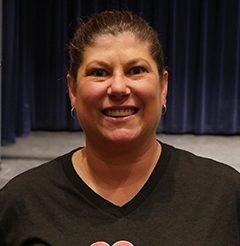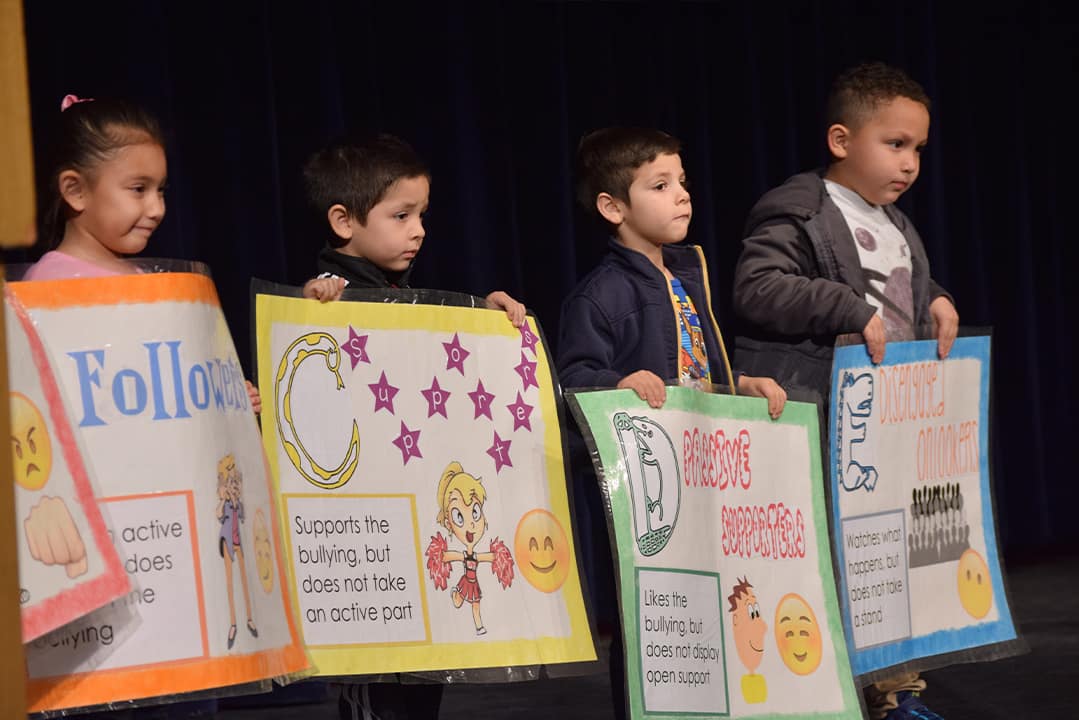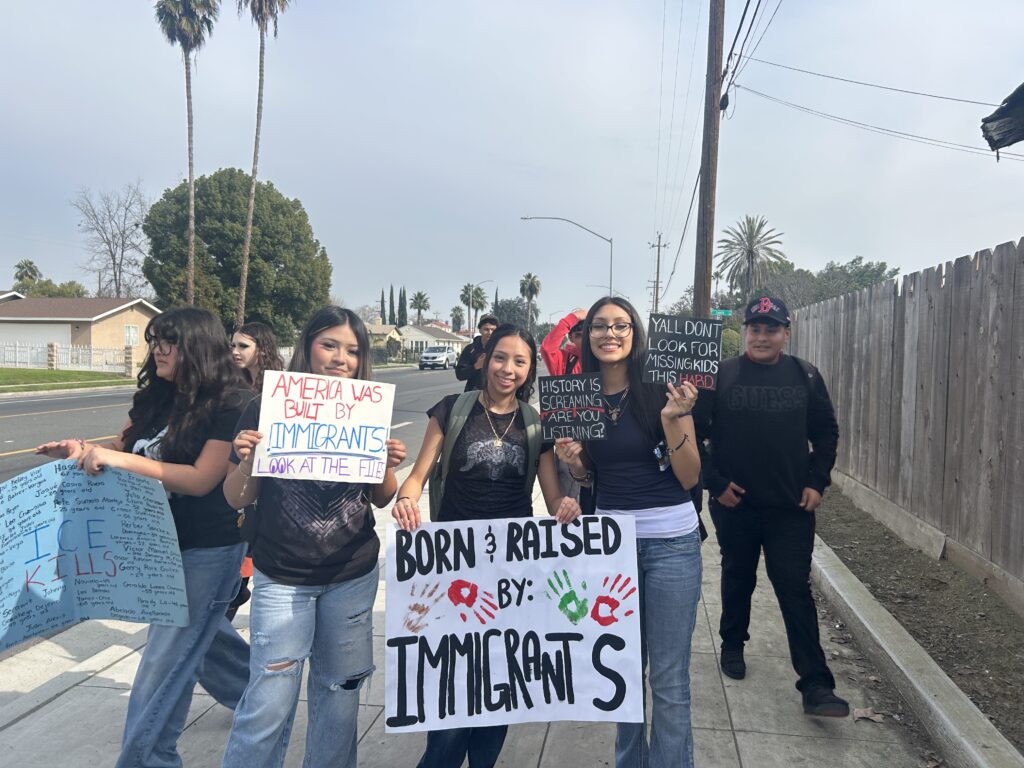Share
Ishan Singh and his friends have been bullied because of their Sikh religion. Dao Yang was called a nerdy over-achiever. Kaylee Gudino got picked on because of her looks — in the second grade.


Club adviser Cyndi Mello started the first Don’t Laugh at Me club in 2001 when she was a “novice” teacher at Fowler High School and, in the wake of the Columbine High School shooting massacre, wanted to do something to help students feel like they belonged.
The concept for Don’t Laugh at Me stemmed from a class writing assignment and the 1998 song with the same name, says Mello, who brought the club to Sunnyside in 2005.
After listening to the song’s lyrics — “Don’t laugh at me, don’t call me names, don’t get your pleasure from my pain” — the students wrote in their journals about what the song meant to them.
And they wanted to take it further.
Elementary School Is ‘Where It Starts’
“When my students first brainstormed the concept of presenting, they didn’t want to present at the high schools,” Mello recalls, who teaches English at Sunnyside. “They wanted specifically to go to the elementary schools, because they said, ‘Ms. Mello, that’s where it starts.’

She didn’t tell anyone at school about what was happening (although she did tell her sister, then an eighth-grader at a middle school). The bullying ended when the sixth-grader moved on to middle school.
A few years later, she saw a classmate becoming emotional while watching a DLAM performance. “I had a friend, and he was getting bullied,” she says. “I was sitting next to him, and I remember seeing he was in tears. And that impacted me, because I knew what was going on with him.”

Don’t Stay Silent
Not speaking out is fairly typical for victims and witnesses to bullying. But the federal bullying prevention website, StopBullying.gov, reports that when bystanders intervene, bullying stops within 10 seconds more often than not.
The website reports that the rates of bullying may be declining at the same time that there is a growing awareness of bullying. But the rates still remain high:
- As many as one-third of students say they have been bullied at least once.
- About 30% of young people admit they have bullied someone.
- More than 70% of young people and school staff have seen bullying in schools.
- However, only 20% to 30% of bullied students notify adults.

District Focuses on Bullying Prevention
Fresno Unified’s efforts to combat bullying are multifold and include putting teachers on special assignment to help schools implement the Olweus Bullying Prevention program, considered by many to be one of the most effective.
Trainers from the district’s Department of Prevention and Intervention work with teams at school sites on curriculum for students. The goal is to create awareness among students and adults about what bullying is, says director Rita Baharian.

“We do a lot of ‘get to know who’s in your class, get to know your classmates,’ ” she says. “Because when you care about each other, you’re less likely to harm each other.”
The message that Sunnyside’s DLAM Club brings out to elementary schools helps reinforce those messages, she says: “They’re able to go and contribute to their community. But they’re also doing the education part, but it’s coming from the student lens, which I think is really powerful.”
Sunnyside Club Is Unique in Fresno
But only Sunnyside has Don’t Laugh at Me.
In some years so many students clamor to join the club that Mello has to hold auditions. She’s stopped attending club fairs at the southeast Fresno high school because word of mouth and recruitments by fellow students quickly fill the club’s roster of 30 to 35 students.
At the start of each school year, students in the club each write a poem that starts with the phrase “I am the person who was bullied because …”
Some of their answers are incorporated in the skits and poems that they write for that year’s performances.
With restorative practices classes and programs becoming more widespread in the district, DLAM sought input from Sunnyside’s restorative practices counselor to review and help rework the curriculum presented in the performances, she said.

Bullying Comes in Many Forms
Sophomore Ishan Singh, 15, says he and Sikh friends have been called terrorists because of their brown skins and because many Sikhs wear turbans, which are part of their faith.
“That is not who we are,” he says. “We’re very bright people, we’re very strong people. I just want to let the world know who I am, and what it means to me to be a Sikh, and how I’ve been through these things but I don’t let it affect me. I know who I am, and who I will always be.”
Senior Dao Yang, 17, says she was too shy to join DLAM as a freshman, even though she “really really” wanted to join. She was glad when one of her friends signed on with her when she was a sophomore.
Getting The Message Across

Dao says she didn’t recognize when she was younger that she was being bullied. “I thought they wanted to be friends with me, but now in looking back I realize I actually did get bullied” as an over-achiever, she says.
Bullying may not happen as often among older students, but it does still happen, Dao says. When a special education student was “jumped” by other students at Sunnyside earlier in the school year, DLAM students drew up posters to express their outrage.
“It’s not cool to bully because we’re in high school. We’re kind of adults already, so you shouldn’t be doing that,” she says.

DLAM Gives Sunnyside Students a Boost
DLAM isn’t just a way to mentor and educate younger students in Fresno Unified about bullying. It’s also a service-learning experience that allows club members to develop their creative writing, public speaking, and civic engagement skills.
Mello says the club has been particularly useful to students who struggle with public speaking.
One Sunnyside student who was enrolled in the Doctors Academy program was almost pathologically shy when he joined DLAM. Over time his public speaking skills improved, and by the time he graduated he was selected to deliver his graduating class’s valedictory address, Mello said.
Taking The Show on The Road
High up on one wall is a banner that declares Balderas as a Bully-Free Zone and lists four anti-bullying rules.
The lights dim and hundreds of elementary school students sitting cross-legged on the floor fix their eyes on the stage where “big kids” in black T-shirts sing songs, recite poems, and act in skits.
As the DLAM members sing along to “Don’t Laugh At Me,” which marks the end of each performance, some portray different characters from the song, including a teenage mom and a homeless man in a wheelchair.


Driving Home The Lesson
The DLAM presentation was particularly timely because the school had learned about a new incident of cyberbullying, vice principal May Lee-Stanton says.
“It connected to something that had happened just this morning, and I just thought, this is perfect,” she says. “We need to be reminded it’s happening daily, and it’s something real that our kids face daily.”
Lee-Stanton says bullying typically isn’t a problem at the elementary school but does surface on occasion, as at any school. “We just want to make sure that our kids feel safe, and that they know what to do. It’s all about bringing awareness to our students.”

Show Reinforces Anti-Bullying Message
Fifth-grader Khalyna Thao, 11, says she’s glad the show at Balderas helps reinforce the message that students shouldn’t bully other students, that and bullied students shouldn’t be afraid to stand up for themselves and tell someone about what’s happening.
She says she didn’t do that, at least initially, when she was bullied as a younger student for how she dressed and for being smart. “I was afraid I would have gotten picked on more, so I did nothing about it.
“But my friend came along to help me and stood up for me.” Khalyna then decided to tell a teacher, and “everything worked out in the end.”
After that when she saw other friends being called or names or pushed to the ground, “I had to go help them out,” she says.

‘I’m Not Gonna Make Fun Of People’
Sixth-grader Jacob Serna said he’s never been bullied and hasn’t seen it at Balderas, but he knows he would want to help anybody who was targeted by bullies.
During the performance at Balderas, Kaylee looks out into the audience and sees a student who reminds her of her friend who was bullied years ago at Bakman.
“You always find that one kid that’s in tears, and you just want to give them a hug, but you can’t because you’re on stage singing,” she says. “It’s so sad to see.”

Categories

Teen Arrested at Visalia Mall After Firearm Report

Tumblr Goes Down for Thousands, Downdetector Reports
















